Intel X25-M SSD: Intel Delivers One of the World's Fastest Drives
by Anand Lal Shimpi on September 8, 2008 4:00 PM EST- Posted in
- Storage
Real World Performance with PCMark Vantage
Next up is PCMark Vantage, another system-wide performance suite. I chose to run the whole suite rather than just the HDD test to hopefully better characterize real world performance of these drives.
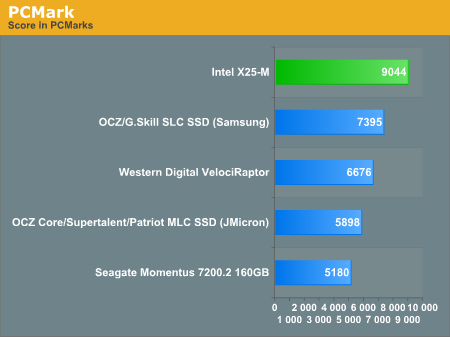
If we look at the individual test subsets of PCMark Vantage we can see the drive's strengths at work.
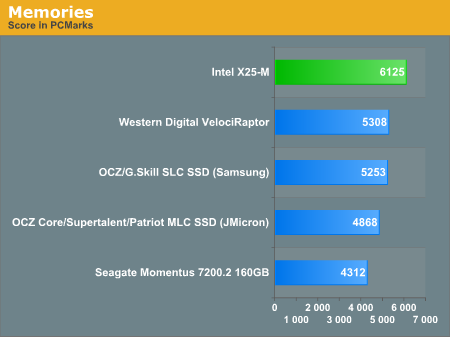
The memories suite for example includes a test involving importing pictures into Windows Photo Gallery and editing them, a fairly benign task that easily falls into the category of being very influenced by disk performance. The end result is a 15% performance advantage over the VelociRaptor, a 16.6% advantage over the Samsung SLC based SSDs and a 42% advantage over the 2.5" Seagate Momentus 7200.2 HDD - the X25-M is great for a desktop, but a miracle for a notebook.
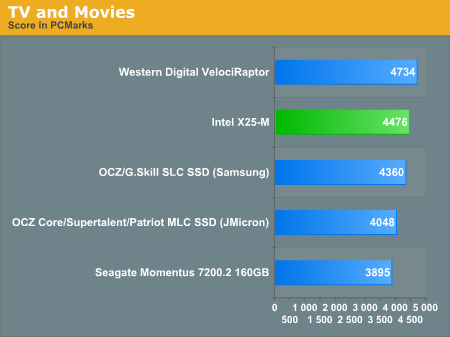
The TV and Movies suite shows that the X25-M won't always dominate. Here the tests are focused on video transcoding which is mostly CPU bound, but one of the tests involves Windows Media Center which tends to be disk bound. Despite the nature of the test, the X25-M competes at the top of the chart but is bested by the VelociRaptor. It's performance isn't bad, but not earth shattering. Again, compared to other notebook drives it is a dream come true.
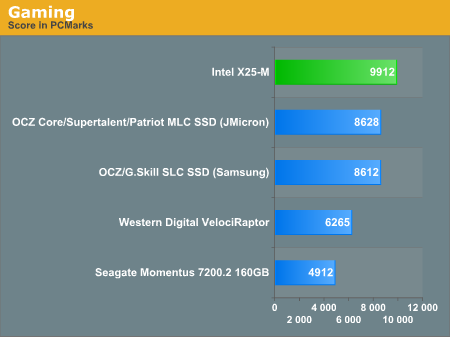
The gaming tests are very well suited to SSDs since they spend a good portion of their time focusing on reading textures and loading level data. All of the SSDs dominate here, but as you'll see later on in my gaming tests the benefits of an SSD really vary depend on the game. Take these results as a best case scenario of what can happen, not the norm. You can also see how tempting it is to opt for one of those JMicron based MLC SSDs, they perform quite well here - the test simply doesn't show the ugly side of living with them.
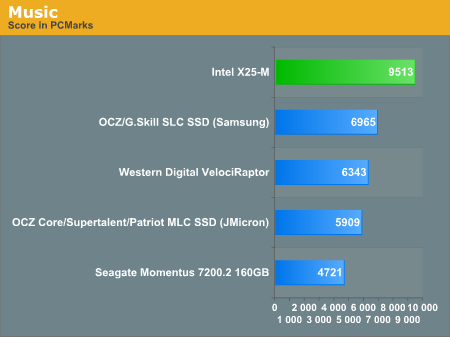
We're back to utter domination in the Vantage Music test. Here the main test is a multitasking scenario, which SSDs do quite well in: the test simulates surfing the web in IE7, transcoding an audio file and adding music to Windows Media Player (the most disk intensive portion of the test). The X25-M is nearly 60% faster than the VelociRaptor, around twice the speed of the Seagate Momentus 7200.2 and over 37% faster than the Samsung SLC based SSDs. When the X25-M is fast, it's very fast.
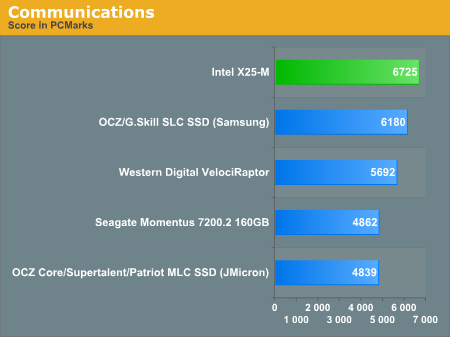
The Communications suite is made up of two tests, both involving light multitasking. The first test simulates data encryption/decryption while running message rules in Windows Mail. The second test simulates web surfing (including opening/closing tabs) in IE7, data decryption and running Windows Defender.
Despite the inclusion of Windows Defender, the X25-M's advantage over the VelociRaptor is only 18%. I would honestly expect more based on some of my other system scanning tests, but I believe the reason we're seeing general domination and not utter destruction is that the tasks being run alongside Windows Defender are quite light on the disk. Yes, I am nitpicking an 18% victory - this drive is that good. The SLC drives do well here but are no match for the X25-M. It's in tests like this that the X25-M really earns its keep, it delivers SLC performance at a much lower cost.
The Productivity test is awesome, let me explain:

In this test there are four tasks going on at once, searching through Windows contacts, searching through Windows Mail, browsing multiple webpages in IE7 and loading applications. This is as real world of a scenario as you get and it happens to be representative of one of the most frustrating HDD usage models - trying to do multiple things at once. There's nothing more annoying than trying to launch a simple application while you're doing other things in the background and have the load take seemingly forever.
Note that the test itself isn't very write intensive, so even the JMF602 based MLC drives do well here. I can attest to this as one of the things that drove me to put a SSD in my desktop was that I wanted my applications to pop up instantaneously, regardless of what I was doing. The pausing doesn't get a chance to rear its head, so all of the SSDs rule the playing field here. The X25-M delivers 2x the performance of the VelociRaptor here and is faster than every other drive. Enough said.










96 Comments
View All Comments
aeternitas - Thursday, September 11, 2008 - link
Converting all your DVDs to divx is a silly idea. Why would you want to lose dynamic range and overall quality (no matter the settings) for a smaller movie size when 1TB costs 130$?SSD = Preformance (when done right)
HHD = Storage.
johncl - Tuesday, September 9, 2008 - link
Noise isnt a big problem on a 3.5" in a media pc as the other poster states. But heat can be a problem, especially if you plan on passively cool everything else in the computer. An SSD will solve both problems, but only if the SSD is the only disk in the system. From what I understand you want to have both in yours which makes sense since movies/music occupy a lot of space. In that case you will not experience any improved performance since the media would have to be read off the mechanical drive anyway.Your best bet would be to build yourself a small media server and put all noisy hot mechanical disks in that and use small SSDs on your media pc (and indeed any other pc). That way you get the best of both worlds, fast response on application startup/OS boot, silent and no heat - as well as a library of media. You would probably have to use a media frontend that caches information about all media on your server though so it doesnt have to wait on server harddisk spinup etc for every time you browse your media. Perhaps Vista Media Center already does this?
mindless1 - Thursday, September 11, 2008 - link
An SSD will not "solve" a heat problem. The hard drive adds only a small % of heat to a system and being lower heat density it has one of the less difficult requirements for cooling.Speed of the HTPC shouldn't be an issue, unlike a highly mixed use desktop scenario all one needs is to use stable apps without memory leaks then they can hibernate to get rid of the most significant boot-time waiting. Running the HTPC itself the OS performance difference would be trivial and the bitrate for the videos is easily exceeding by either storage type or an uncongested LAN.
piroroadkill - Tuesday, September 9, 2008 - link
To be honest most decent HDDs don't make significant noise anyway, even further quelled by grommets or suspending the drive.Also, the reads will occur on the drive you're reading the movie from - so if you plan to use an external HDD as the source, this will make no difference whatsoever.
dickeywang - Tuesday, September 9, 2008 - link
Imaging you have a 80GB SSD, with 75GB been already occupied by some existing data (OS, installed software, etc), so you only have 10GB space left, now lets say you write and then erase 100GB/day on this SSD, shouldn't the 100GB/day data all be written on the 5GB space? So each cell would be written 100GB/5GB=20cycle/day, so you will reach the 10000cycle/cell limit within less than 18months.Can someone tell me if the analysis above is correct? I guess when they say "100GB/day for 5 years", they should really take into account how much storage space that is un-occupied on the SSD, right?
johncl - Tuesday, September 9, 2008 - link
A good wear leveling algorithm can move about "static" blocks so that their cells are also available for wear. I do not know if the current implementations use this though. Anyone know this?Lux88 - Tuesday, September 9, 2008 - link
I remember reading a number of SSD reviews, but it's first time I read about the pauses. Indeed, quick search revealed 5 articles, starting from May 2007, but the conclusions only mentioned a high price and a small capacity as drawbacks. Nothing about freezing nor pauses. Some of these 5 probably were SCL-drives, some MLC.It's funny how a simple multitasking test can reveal an Achille's heel of large group of products, just when a product appears that doesn't suffer from this particular drawback.
Overall good article and good info. So good that all the previous articles on the matter of SSDs on this site seem bad in comparison. Thanks for the info anyway, better late than never ;).
eva2000 - Tuesday, September 9, 2008 - link
If the OCZ Core controller does indeed have 16KB on chip cache for read/writes maybe that's the problem as OCZ Core pdf states for their SSD"each page contains 4 Kbytes of data, however, because of the parallelism at the back end of the controller, every access includes simultaneous opening of 16 pages for a total accessible data contingent of 64 Kbytes"
????
araczynski - Tuesday, September 9, 2008 - link
looks quite promising. maybe within about 2 years they'll get the bugs worked out, a more realistic price, and an extended life span, and i'll replace my regular drives.yyrkoon - Tuesday, September 9, 2008 - link
"No one really paid much attention to Intel getting into the SSD (Solid State Disk) business. We all heard the announcements, we heard the claims of amazing performance, but I didn't really believe it. After all, it was just a matter of hooking up a bunch of flash chips to a controller and putting them in a drive enclosure, right? "You mean you did not pay attention? I know I did, because Intel has always been serious with things of this nature. That and they are partnered with Crucial(Micron) right ?. . . Now if this was some attempt at sarcasm, or a joke . . .
Seriously, and I mean VERY seriously, I was excited when Anandtech 'reported' that Intel/Micron were going to get into the SSD market. After all affordable SSDs are very desirable, never mind affordable/very good performing SSDs. That, and I knew if Intel got into the market, that we would not have these half-fast implementations that we're seeing now from these so called 'SSD manufactures'. Well, even Intel is not impervious to screw ups, but they usually learn by their mistakes quickly, and correct them. Micron (most notably Crucial) from my experience does not like to be anything but the best in what they do, so to me this seemed like a perfect team, in a perfect market. Does this mean I think Micron is the best ? Not necessarily. Lets me just say that after years of dealing with Crucial, I have a very high opinion of Crucial/Micron.
"What can we conclude here? SSDs can be good for gaming, but they aren't guaranteed to offer more performance than a good HDD; and Intel's X25-M continues to dominate the charts."
Are we reading the same charts ? These words coming from the mouth of someone who sometimes mentions even the most minuscule performance difference as being a 'clear winner' ? Regardless, I think it *is* clear to anyone willing to pay attention to the charts that the Intel SSD "dominates". Now whether the cost of admission is worth this performance gain is another story altogether. I was slightly surprised to see a performance gain in FPS just by changing HDDS, and to be honest I will remain skeptical. I suppose that some data that *could* effect FPS performance could be pulled down while the main game loop is running.
Either way, this is a good article, and there was more than enough information here for me(a technology junky). Now lets hope that Intel lowers the cost of these drives to a more reasonable price(sooner rather than later). The current price arrangement kind of reminds me of CD burner prices years ago.